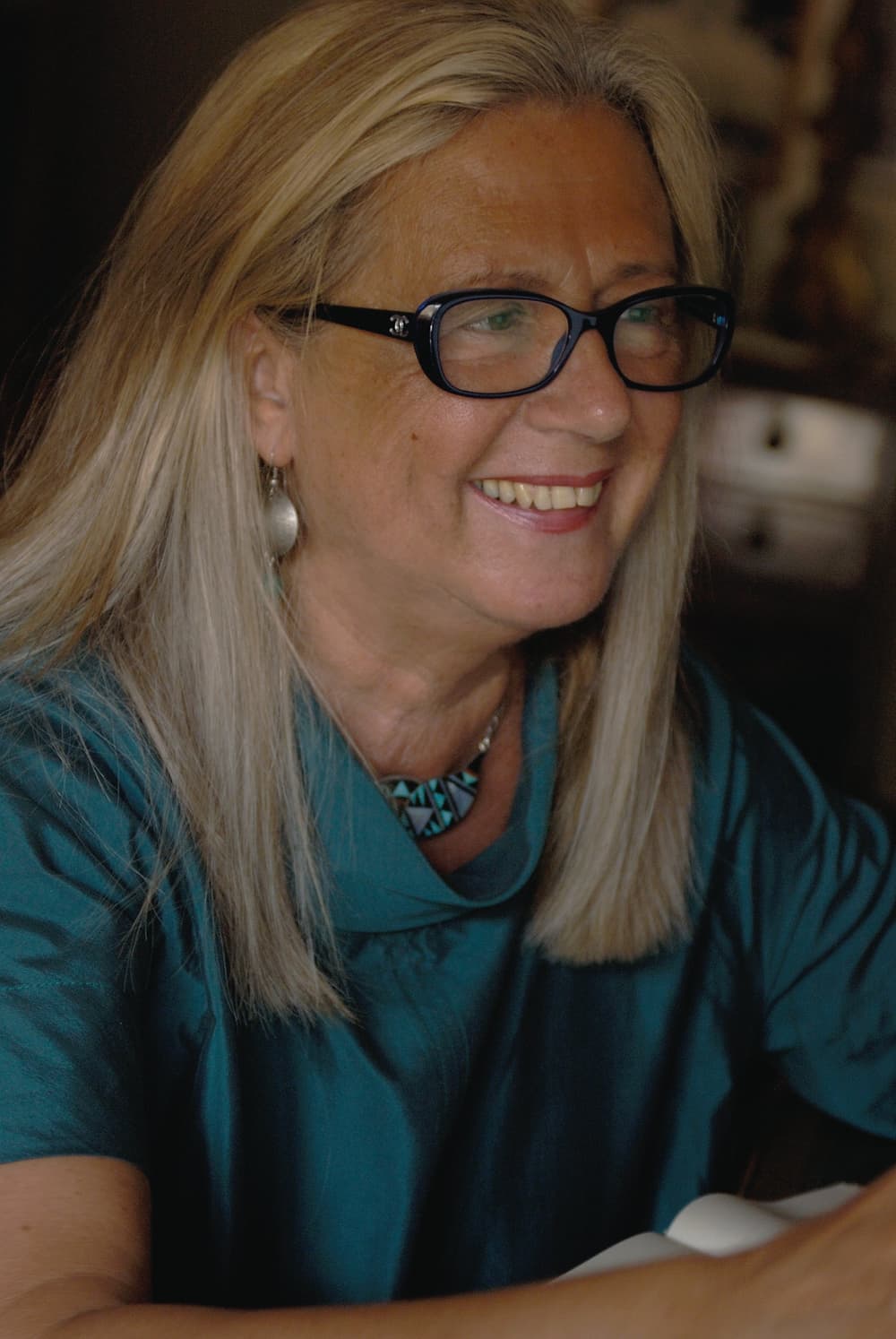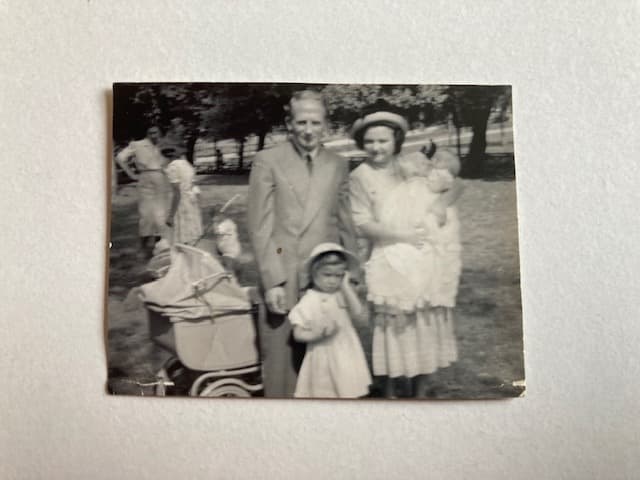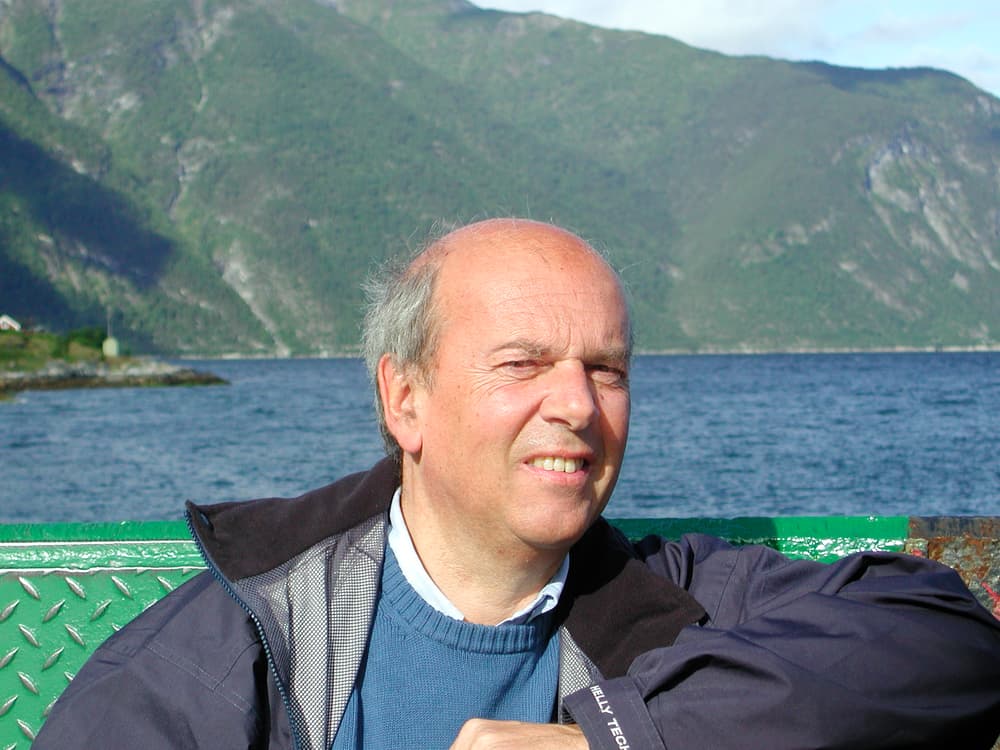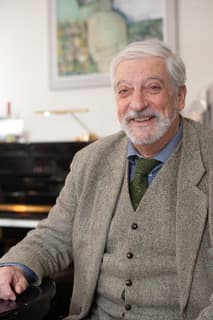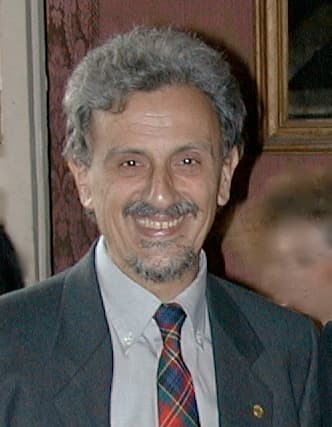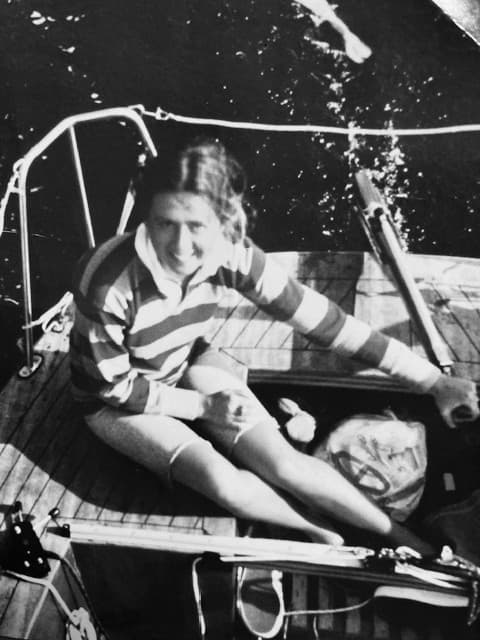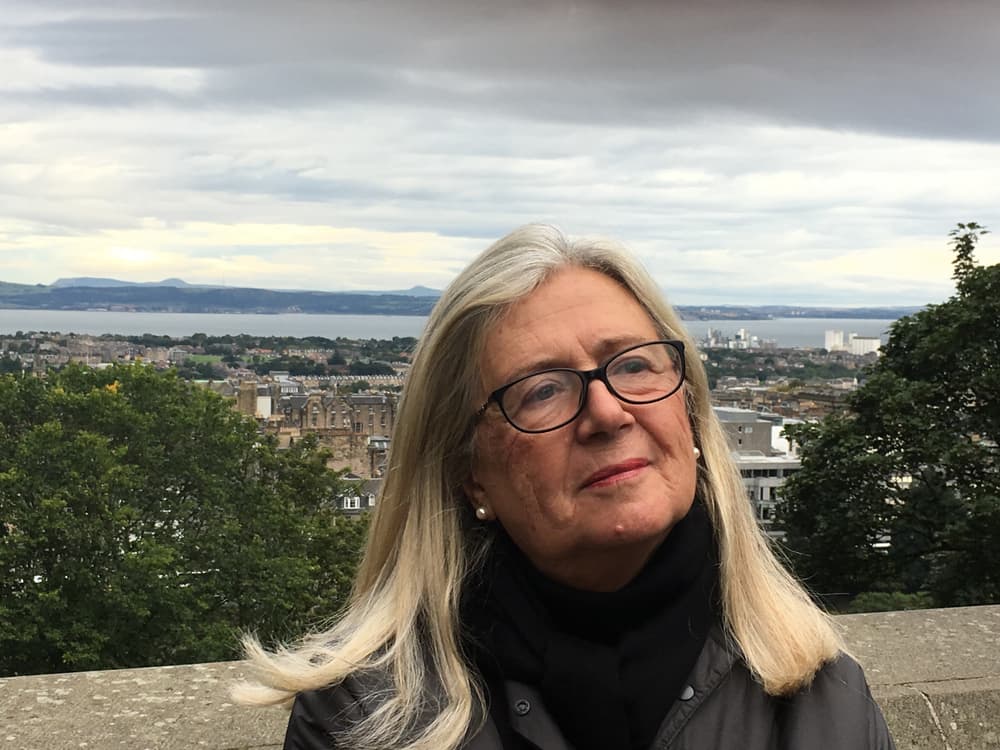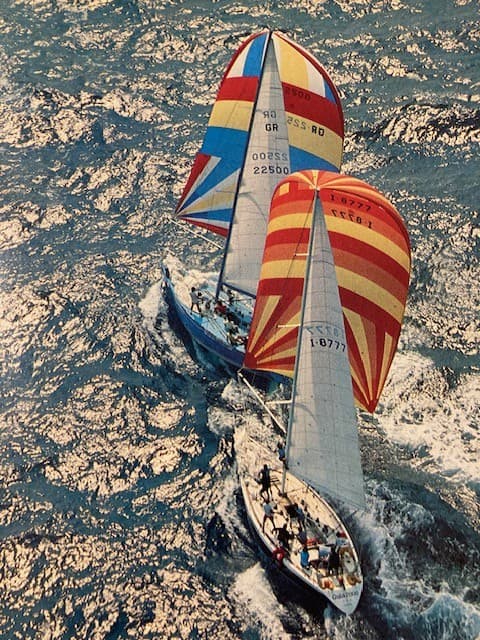Elisabetta Strickland and I met at the Institut Mittag-Leffler in Stockholm in the fall of 1980 and have kept in touch ever since. (As a curiosity, we once had a photo exhibit together in Rome.) Hence, it was natural for me to include her in the ongoing series of interviews with women mathematicians, especially as she has taken a very active role in promoting women in mathematics.
Elisabetta Strickland, Rome 2011 (photo by Martina Lanini).
©All rights reserved.
Ulf Persson: Let us start from the start. Why not give us some family background?
Elisabetta Strickland: You mean talking about my mother and father?
UP: Go ahead!
ES: My father was a Royal Air Force officer in the Second World War, in fact in Africa. Afterward he was sent to Italy when the allies liberated Rome, and they needed to find some Italian who was fluent in English to act as an interpreter. My mother was well-qualified for the job, and she applied. My father had to interview the applicants, and he fell in love with her right away.
UP: It was mutual?
ES: Yes, they got married soon thereafter and went to England.
UP: How romantic. Just like that? No problems?
ES: There were some forty Englishmen at the time who married Italian girls. And the priests did not demand them to convert to Catholicism as long as their spouses stayed Catholic and most importantly that their children were raised Catholic.
UP: This makes sense, please continue.
ES: My mother put up with England for a while, but then she realized that she could not live without the sun and went back to Rome.
UP: And your father followed suit?
ES: Naturally, did he have a choice? But then of course he had to face the problem of employment. How could he make a living? He ended up becoming a businessman, importer and exporter, that kind of thing.
UP: Could you be more specific?
ES: Why? It had to do with aluminium on the behest of someone who became a partner. Actually it took us to Venice where we lived for five years. At Lido to be more specific.
UP: What time of life did that happen?
ES: In my case between five and ten years of age.
UP: But you returned to Rome.
ES: Yes we did. I do not think that my mother could conceive of living anywhere else, nor can I by the way.
UP: Anything else you could add?
ES: My father was compelled to travel a lot, so in fact I did not see too much of him in my childhood. But he was not an absent father, he really took care of us.
UP: And your mother was a present mother?
ES: Very much so.
Elisabetta Strickland standing in Rome 1952 with her father Reginald Charles Strickland and her mother Esperia holding her baby sister Sara.
©All rights reserved.
UP: Your background does not explain your interest in mathematics.
ES: I was a school girl, in fact an exemplary one, very studious, very serious and very successful. I won so many prizes, I was very proud of that.
UP: So mathematics was only one among other subjects you excelled in?
ES: You can say that, but the truth is that I had an excellent math teacher, very clever, it was a pity that he was stuck in life teaching in high school and not at university.
UP: The intellectual quality of teachers at that time was typically quite high, after all there were few university positions, so sad as his case may have been, it was far from being unusual. But he clearly made a difference, in particular to you.
ES: Yes, he taught me so much so when I started out at the university I already knew so much. What I particularly appreciate about him was his encouragement to solve problems in unconventional ways.
UP: So you start university.
ES: I started out as an engineering student.
UP: Really?
ES: Yes, I had this idea of wanting to build bridges. But it only lasted for a week. I was the only girl among one hundred and fifty or so students, and once when I dropped my pencil, all of them dived down to pick it up, begging me for my phone number, so we could get together. That was too much, and I fled to the math department where there were at least some women and hence some semblance of sanity.
UP: So how was that?
ES: First it was a four-year program, the first two years devoted to become mathematically literate, and then you had three options. Either doing research, with an academic career, or teach, or do applied mathematics and go out in the supposedly real world. There was never a question in my mind to consider anything beside the first alternative.
UP: This is nice to know, but it does not address my question.
ES: Fair enough. 1968 was as you must remember a special year when it came to students, and I was fully swept up in the movement. I was convinced that the educational system was rotten and had to be reformed, and I discovered in myself an affinity, maybe even a talent, for speaking publicly. I enjoyed it immensely, as I enjoyed that period. I flourished.
UP: You also met your future husband Corrado de Concini at that time?
ES: Not so fast. Yes, there was this guy de Concini who never bothered to show up at lectures, but had the audacity to ask me for notes. No doubt a very lazy guy.
Her husband Corrado de Concini in Ireland 2006.
©All rights reserved.
UP: So unlike the case of your parents, there was no love lost.
ES: Love? It did not enter my mind. But I have to admit that when he handed back the notes he had annotated them with remarks that revealed that he was a very clever guy.
UP: And you find cleverness in guys very attractive, trumping physical attraction?
ES: Now you are at it again. Let me just point out that my opinion of the guy became more nuanced, and I saw him in a more favorable light. But that happens to most people when you get to know them better. And to put the topic to rest, de Concini’s love interest was clearly elsewhere; he ended up married for some years, and I had a boyfriend who studied engineering, and we were supposed to get married. But I changed ideas.
UP: Yes, I have some vague memory of that, as you bring it up. So what happened after the four years of basic university education?
ES: In Italy there was not a tradition of obtaining Ph.D.’s. You just continued on your own writing papers and if you were lucky you obtained a university position, or else taught at school, or went out in the so-called ‘real world.’ But things started to change a little after 1968, e.g., de Concini decided to go to Warwick and get a Ph.D., actually with Lusztig as an advisor.
UP: Let’s talk about your career instead.
ES: My mathematical career was rather straightforward. I spent my sabbaticals using a National Council of Research grant and a NATO grant. Then I applied successively for the three different levels of professorships, i.e., assistant, associate and full ones. I became full professor in 1987. The noteworthy thing was that I played according to the rules, much to the frustration of the Italian mathematical community. The rules being that each position was to be publicly announced and decided upon by a scientific community ostensibly arguing on strict scientific merits. The tradition in Italy, as opposed to Northern Europe, was that the appointments were made on a national basis, the powerful clique at each department deciding whom to get, the professor typically choosing their own successor. Traditions die slowly, and I was often approached and asked to withdraw my application, but I persevered as I had the legal right to apply and I stuck to it, and the appointed committees clearly took their duties seriously and did not bow down to departmental pressures.
UP: You had to qualify for this positions writing papers and I doubt you were sitting put in your study in Rome. What did you do, and more specifically what kind of mathematics did you do? What kinds appeal to you, and what leaves you cold?
ES: That was a lot of questions. Where should I begin? About mathematics, I must say that I do not like computations, so thus I was never interested in analysis…
UP: Sorry, but what is the connection? Analysis is not about computations…
ES: You should of course not take ‘computations’ literally, but proofs in analysis are very intricate involving clever estimates, you more often than not have no idea what is going on, the trees hiding the forest.
UP: Yes, in analysis you get your hands dirty, and that does not appeal to you?
ES: I prefer to keep my hands clean. I like abstract proofs based on concepts rather than, let me say, logical computations which do not leave you any wiser.
UP: You prefer slick proofs.
ES: You can put it that way. But algebra and geometry I find much more congenial than analysis.
UP: Even commutative algebra?
ES: Yes, I used commutative algebra in my work. But early on I got fascinated by group theory, in particular finite groups. But there was no group theory in Rome, so I commuted to Padua for some time. I was also recommended by Claudio Procesi to get into representation theory if my interest in groups was serious. Very good advice.
UP: How come you were drawn to algebraic geometry?
ES: How could I resist, I am Italian after all! As to your other question, I did go abroad to widen my horizons. In particular, I went to the Boston area. And I also had some interaction with Joe Harris, all of which gave me a nudge towards algebraic geometry. Griffiths in particular urged me to think of something in algebra which could be helpful for the varieties I was interested in at that times. I worked very hard, studying in the library day and night, I would not be able to summon such single-minded devotion now.
UP: We have talked a lot about doing mathematics, but almost nothing about the mathematics which you have been doing. I think we have touched on this before, but when you do mathematics, is it always with a publication in mind, or do you think of something just for fun regardless whether it has a fair chance of ‘paying’ off or not.
ES: I certainly take a professional attitude, I do not fool around, I always have a goal in mind, I feel I cannot waste time.
UP: Do you collaborate a lot?
ES: Not at all. I very much prefer to work alone, to talk mathematics to other people often gets me confused. This does not mean that I do not interact with other mathematicians, asking questions, getting new ideas, but the idea of actually working with someone solving a specific problem does not appeal to me at all. Too much of an interference.
UP: So could we be a bit specific about your work without getting into technical details?
ES: I will try. I did start out in finite group theory, but I left it for algebraic geometry, as I already told you.
UP: What about finite group theory?
ES: You are coming back to it. True, my first published paper, back in 1972, concerned semigroups, but it was just a short note. But throughout the 70s all my mathematical papers concerned finite groups, but getting into the 80s my future husband Corrado de Concini started to have a more significant influence. This was a period I have definitely put behind. I was just too isolated in Italy, to say nothing about Rome.
UP: So back to algebraic geometry. What did you study?
ES: More specifically I was studying special varieties with a lot of structure and hence there being much to play around with. And also with some interesting applications, inter-mathematical I should add.
UP: Varieties as such?
ES: Varieties of complexes, of projectors, flag-varieties, the conormal bundle of the determinantal variety, varieties related to symplectic vector spaces. Other examples are varieties given by where is a Lie group and is a parabolic subgroup. The latter may not at first look very geometric, but you can talk about lines on them. This might give you an inkling of my taste.
UP: What do you do with those varieties?
ES: All kinds of things, like finding their defining equations. And then of course my interest in groups has not abated, much of what I do centers on groups, I am doing invariant theory.
UP: Do you do it from a complex analytic point of view, working with truly continuous groups?
ES: Not at all, I am very much interested in positive characteristics, and have generalized results by Hermann Weyl and George Kempf in 0 characteristic to positive. The methods are quite different and involve a lot of combinatorics.
UP: Could you elaborate on the Weyl bit?
ES: Sure. Am I allowed to be a little bit technical?
UP: Go ahead.
ES: Let be a symplectic vector space. Consider for an integer the algebra of endomorphisms of the tensor algebra . Inside it, you find the spin algebra and you are interested in its commutator. This can be described as the algebra generated by the symmetric group acting on the tensor algebra by permutation on the factors, which turns out to be isomorphic to , where is the ideal generated by the anti-symmetries on letters, where is the dimension of .
UP: That was quite a mouthful. As you do things also in finite characteristics, are there interesting connections to finite group theory, in particular the work you used to do, and which might have been of some help?
ES: It has more to do with representations of classical groups over finite fields of arbitrary characteristic.
UP: What is the work you have been most proud of?
ES: I do not know about being proud of, but the hardest work was in connection with so-called wonderful compactifications.
UP: Which are not so wonderful, I gather. So without being technical could you elaborate?
ES: No. Let me just say that those compactifications concern adjoint semisimple groups, in arbitrary characteristic mind you. There is nice geometry involved, some aspects of which I have been exploring. To be more specific, I have been looking at wonderful compactifications of symmetric varieties and their Chow rings and trying to compute some invariants thereof. The so-called ring of conditions, if you have heard about that?
UP: No.
ES: Anyway. It involves a lot of combinatorics.
UP: Are you still active?
ES: Yes, in fact I have just started a research project with a colleague M. Lanini studying the cohomology of a flag variety under a Poincaré–Birkhoff–Witt degeneration.
UP: So you are after all collaborating.
ES: I am not a fanatic, sometimes it is after all quite natural and convenient.
UP: Could you tell me a little of your life as you became an established professor? When was that?
ES: This was in connection with the birth of my son Guglielmo, who was born in 1988, as you should know…
UP: Yes, on the very same day as my youngest daughter Alina…
ES: I had got a full professorship at Roma Tor Vergata, a new university in the city, which had been founded just a few years earlier. The facilities were temporary and primitive, but a few years later they improved, though they were placed in the outskirts of Rome some 25 km from the center. I had to commute by metro and bus, which took me an hour and a half each way.
UP: It must have been a nightmare? With a baby and everything.
ES: Not at all. In many ways it was one of my most productive times. I sat and worked hard while in transit. I read papers, I wrote articles, you name it. Sometimes I was so immersed in what I was doing that I forgot to get off at the last stop, and had to be rescued in the dark by the cleaning staff of the Metro. From there on there was a bus to the university, and I was lucky if I got a seat, but was fun nevertheless mingling with students and colleagues.
UP: Now we have not touched upon the issue of women and mathematics, as far as it is an issue at all.
ES: What about it?
UP: You have been active in it, sitting on many committees as I understand, such as the Women in Mathematics Committee of the European Mathematical Society. Do you enjoy such work?
ES: It has nothing to do with enjoyment at all, it is just very important. I have really put in much effort, and it has been a lot of work during many years. So many committees, so many meetings. Of course, I have to admit that arranging meetings could be quite fun, but it amounts to a lot of work. But meetings are very important, and this of course goes beyond the issue of women in mathematics.
UP: What is the major issue when it comes to women and mathematics?
ES: It is representation, they are simply underrepresented in all kinds of respects, as editors of journals, in prize committees, in short whenever it comes to female influence and power. How come until Seoul there were no single female Fields medalist? I remember discussing the matter with Ragni Piene a year or so before.
UP: As for underrepresentation, women are in great demand to sit on committees in order to meet the requirements, but that is not necessarily welcomed by women, many who feel obliged to participate unduly in such work which I assume consumes a lot of time and effort and thus is not always welcome, maybe even in some cases hampers their careers. Is not the basic problem that so few women go into mathematics, and actually why is that a problem?
ES: It goes without saying this is an important cause. I would say that France has a long tradition of women doing mathematics and provides an example to all other countries. It is also true that a lot of women go into mathematics in Italy, but the majority does not have the ambition to go beyond teaching in high school; but that might change. The academic situation is much tougher now than forty years ago when we were young, and this holds both for women and men. As to committee work, as I said, I have committed a lot of time to it, and out of duty, not out of real pleasure. And I feel that it has not had the effect I had hoped for, so I have to admit to a great disappointment. I will not put the blame on some specific institutions, at least not publicly.
UP: A question I often pose to women, at least to successful women, is whether they personally have felt any suppression; for feminists outside mathematics this is taken for granted due to the above-mentioned underrepresentation, but so far I have not met anyone who has admitted it. Would you be an exception?
ES: Let me say that I am a tough lady, I might not look it, but I am. I am quite persistent, not to say stubborn, and I stick up for my rights, and I can argue forcefully for them, so maybe I am not the right person to ask.
UP: Let me change track and ask you a personal question: Have you seen mathematics as a career or a calling? In other words, have you seen it as important to get ahead, or has this just been a nice but unintended consequence?
ES: Mathematics is a competitive subject and I quickly realized what was needed. I have worked hard, being by necessity involved in competitions for work, you and your readers are probably familiar with the Italian system of Concorsi when you actually compete for positions nationwide, submitting your work to committees. There are three levels, roughly corresponding to assistant, associate and finally full professor. I have been very lucky that I was able to stay in Rome all the time. Only after reaching the upper level could I relax and have a child, it would have been impossible before that. And by the way, the matter of bearing children really puts women at a disadvantage, I am full of admiration for those successful women mathematicians who have managed to have had many children. Of course husbands can be helpful and supporting, but women cannot escape the concomitant duties unlike men, and even if the men go out of their way they cannot relieve you of more than half of the burden. But this is a digression, where were we…
UP: Talking about the hard work involved in your career.
ES: Oh yes. It also involves a lot of travel.
UP: But that is the fun part, to be cynical for many of us, the most fun part.
ES: Speak for yourself. Travel is unavoidable, you simply have to meet people, to get new ideas and outside stimulations; few indeed are those lone geniuses who are entirely self-sufficient. This is why I travel. And conferences are fun of course, at least the social part, but talking mathematics to people, that is what counts. And of course solving a problem is one thing, indispensable of course, but then you also have to sell your problem and solution and to convince people that what you have done is both clever and important. It is of course great if you have a mentor who explains those things to others, but for most of us you have to do that yourself, and that is quite a challenge.
UP: So the social aspects of mathematics are important?
ES: Very much so, as in all other ways of life. It is very important who you know and in what environment you work. Even if you may not be aware of it, you do absorb so much by mere osmosis. Getting ahead just on your own locomotion is not an option for most people. You need outside ideas, otherwise you dry up. This is something you just have to acknowledge.
UP: So just reading the literature is no substitute?
ES: Of course not, you need to know what to read, and what it really means. You may have an informal conversation with someone and learn more in half-an-hour than you would only learn from reading a paper for months if even that is enough.
UP: Why is that? Is it because a paper is too complete, for the sake of documentation you have to include everything, which of course is a good thing, but not for conveying ideas? For the latter you need some motivation, given the right motivation and some key insight, things will fall into place, because most of a proof is just a matter of transportation, and as such rather tedious to read, as opposed to fill in the details.
ES: Very true. I cannot but agree completely. However, I would like to add something important. You need to meet people in the flesh, it is not enough by e-mail, phone conversations and even zoom. I want to really hear the voices of the others, to become aware of gestures, expression of faces. All of those seemingly peripheral matters actually contribute and can make a difference. And not to forget only by engaging with a person face to face can you tell whether you are dealing with somebody intelligent or not.
UP: Our common friend Fabrizio Catanese used to say that you can only gauge the worth of a mathematician by collaborating with him/her on a paper.
ES: So true! I am so glad that you bring up Fabrizio. Discussing mathematics with him has been one of my most rewarding experiences. It is not so easy to have an interesting and fruitful conversation with a mathematician.
Fabrizio Catanese, in Bayreuth 2022 at the home of his colleague Jörg Rambau (photo by Jörg Rambau).
©All rights reserved.
UP: There has to be a common ground, and that is becoming harder and harder with the increased specialization of mathematics.
ES: Of course you need common ground, that is obvious, but also some kind of chemistry. I have learned a lot of algebraic geometry from Fabrizio, because for one thing he knows a lot obviously, but what is much, much more important is that when he talks mathematics he is not only precise but also clear, and I find this a great help. Then of course from the perspective of algebra I have learned a lot from my husband Corrado and also from Procesi, but I want to emphasize Fabrizio, because most people would not realize that.
Her friend and colleague Claudio Procesi as member of the Abel Prize committee around 2006.
©All rights reserved.
UP: We have now spoken a lot on math and your mathematical career, but people may be curious about the individual Elisabetta Strickland, something that mathematical achievements seldom throw much light on. Was mathematics the only subject that really interested you at school?
ES: By no means. Literature was my favorite subject. And also remember I was interested in all subjects in principle. I should also mention that I very much liked physics, but between that and mathematics my choice was mathematics.
UP: So mathematics was special?
ES: Only to the extent that I was lucky having such a wonderful math teacher.
UP: But that also applied to your fellow schoolmates, so it must go deeper. What about literature, have you pursued that?
ES: I am a reader of course, but most of all a writer; I have always loved to write, and so do you, I know, and I have kept on writing all my adult life. I have published several books, and I regularly contribute articles to various journals. One particular example, is that I edit a Newsletter for Women in academics and have to regularly come up with something. As to interests, I have always loved sailing and at one time in my life I submitted articles to various sailing magazines. They paid well.
Elisabetta Strickland sailing off the coast of Sardinia, 1977.
©All rights reserved.
UP: What are examples of your non-mathematical books?
ES: I have written on female scientists, such as Mary Somerville, who among other things ‘checkmated’ Maxwell, but also on Emmy Noether who stood up to Einstein, and also Sophie Germain, who I claim, provocatively of course, founded mathematical physics and many more not so well known. And then of course on Maryam Mirzakhani, the first female Fields Medalist whose early death was so tragic and such a loss. If you want something less academic and more literary I can refer to I numeri nel cuore in which I, along with my colleagues Ciro Ciliberto and Fausto Saleri, collected some of our short stories, albeit with mathematical themes.
Elisabetta Strickland in Edinburgh.
©All rights reserved.
UP: What about your interest in photography?
ES: That you know about of course, did we not have a photo exhibit together?
UP: That was ages ago. But what about your interest?
ES: I combined it with my sailing activities. I loved to take photos of sailboats, especially engaged in racing. One particular case was when I was hard up trying to shoot a really unconventional picture. I approached a guy with a helicopter and was able to convince him to give me a ride. I entered, he strapped me to the seat and took off. I was a bit apprehensive of course, never having been in a helicopter before, and so he opened the door on my side and turned the helicopter sideways, so I was staring into the void below me. Normally I would have been terrified, but I had a job to do, and I leaned out with my camera and shot several pictures from my unique vantage point. They made a splash, some of them even ended up on the cover of sailing magazines and I got a golden plate from Kodak for one of them.
The helicopter photo taken during the Sardinia cup, 1981.
©All rights reserved.
UP: You got to be famous.
ES: I would not say that, but it certainly had the sweetness of fame, I was very proud. I have another anecdote to give you and your readers a taste of that life. One morning I decided to do something special coming to cover a sailing event. There was the Whitbread race in England. Somehow I managed to get there, I was a research scholar, so with little money at the time; and once there I had the problem of lodging. I discovered a boat with some young Danes and asked them whether I could sleep over in their boat. They responded with due enthusiasm, and we had a wonderful evening laughing, talking and drinking beer. Wonderful, magical times, nothing untoward happened. In the morning they took off for the race, and I was fit for fight.
UP: Do you have any other hobbies?
ES: What do you mean? Is not two such enough? True, I am interested in many things, but if I had not pursued a career in mathematics, I might have been an interior decorator. Such things amuse me a lot. Recently Corrado and I bought some property in Tuscany, which we have set up quite nicely, if for no other reason than to entice our son and his girlfriend, who are living in London, to visit us more often. It seems to work.
Cite this article
Ulf Persson, A woman in a man’s world. Eur. Math. Soc. Mag. 132 (2024), pp. 30–37
DOI 10.4171/MAG/179
